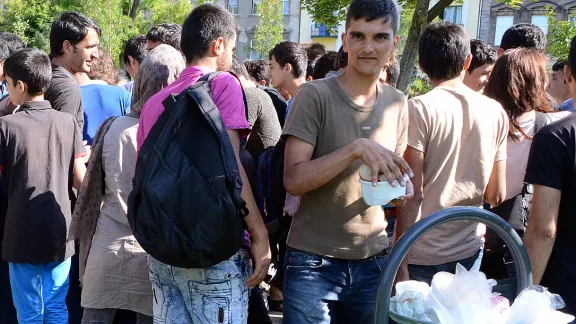
The ELCH offered 150 daily portions of warm meals to refugees at Kelati Station, the main train station in Budapest. Photo: Zsuzsanna Bolla
Nordic and Central Western Europe leaders in solidarity visit to Hungary
(LWI) – The Lutheran World Federation (LWF) leaders in Europe are paying a solidarity visit to the Evangelical Lutheran Church in Hungary (ELCH), 2-3 October, as the region deals with the crisis of refugees and migrants fleeing war and persecution in parts of the Middle East and Africa.
Norway’s Presiding Bishop Helga Haugland Byfuglien and Württemberg Bishop Dr Frank O. July, LWF Vice-Presidents for the Nordic and Central Western Europe regions respectively, will discuss with ELCH Bishop Dr Tamás Fabiny the need for a coordinated Lutheran response in Hungary and across Europe.
Fabiny, LWF Vice-President for Central Eastern Europe, welcomes this additional expression of support from the Lutheran communion leaders. The refugee situation concerns not only the individual countries receiving those seeking refuge but it also needs a unified viewpoint on the European level, he noted.
The Hungarian Lutheran church support to the refugees includes, among others, provision of basic needs such as food, water and clothing; accompanying persons needing special assistance; and offering information in different languages.
“It is important for the churches across the Lutheran communion to have a common understanding of their responsibilities towards refugees,” Fabiny said.
The idea of the solidarity visit was developed during LWF President Munib Younan’s recent visit to Stuttgart. The Lutheran leaders emphasized the need to support and encourage the Hungarian church as it reaches out to the refugees, and to also advocate against tendencies that promote hostility, making the refugees feel unwelcome.
The delegation also includes Mr Ralston Deffenbaugh, LWF Assistant General Secretary for International Affairs and Human Rights, and LWF Council advisor Rev. Klaus Rieth, head of the unit for mission, ecumenism and church development at the Evangelical Lutheran Church in Württemberg, Germany.
They travel to Budapest as the LWF concludes an assessment mission exploring possible humanitarian response support to the ELCH and other ecumenical actors. The LWF has urged its member churches to continue upholding their diaconal vocation by advocating for refugees, noting the efforts of churches also in Austria, Germany and Norway, among others.
“Such practical exchange with the LWF and other partners such as the World Council of Churches (WCC) is highly important for this church,” Fabiny added, referring to the recent WCC visit there, led by the General Secretary Rev. Dr Olav Fykse Tveit.


